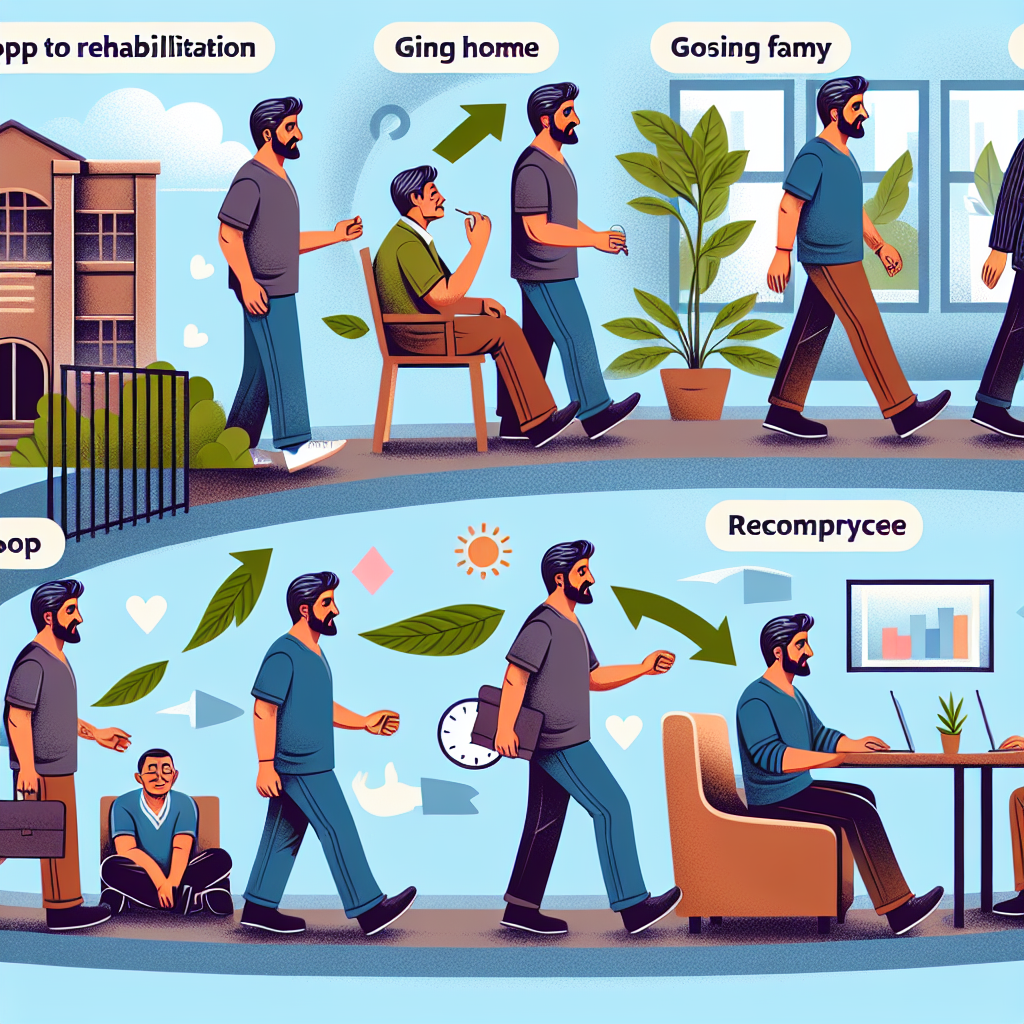-
Table of Contents
“Reclaim Your Harmony: Steps to a Balanced Life After LSD Recovery”
Introduction

Overcoming LSD addiction is a significant achievement that marks the beginning of a new chapter in life. Creating a balanced life after such a profound experience involves addressing various aspects of well-being, including physical health, mental stability, emotional resilience, and social connections. This process requires a comprehensive approach that integrates healthy lifestyle choices, supportive relationships, and ongoing personal development. By focusing on these key areas, individuals can build a fulfilling and sustainable life, free from the shadows of addiction. This guide will explore practical steps and strategies to help maintain balance and promote long-term recovery.
Strategies for Maintaining Sobriety and Mental Health
Creating a balanced life after overcoming LSD addiction is a journey that requires dedication, self-awareness, and a commitment to personal growth. The path to maintaining sobriety and mental health is multifaceted, involving a combination of strategies that address both the mind and body. One of the first steps in this journey is to establish a strong support system. Surrounding yourself with people who understand your struggles and support your goals can make a significant difference. This support can come from family, friends, or support groups specifically designed for those recovering from addiction. These connections provide a sense of belonging and accountability, which are crucial for long-term sobriety.
In addition to building a support network, it is essential to develop healthy coping mechanisms. Life is full of stressors, and learning how to manage them without turning to substances is key. Mindfulness practices such as meditation and yoga can be incredibly beneficial. These activities help to center the mind, reduce stress, and promote a sense of inner peace. Regular physical exercise is another powerful tool. Exercise releases endorphins, which are natural mood lifters, and helps to improve overall physical health. Whether it’s running, swimming, or simply taking a walk in nature, finding an activity that you enjoy can make a significant difference in your mental well-being.
Another important aspect of maintaining sobriety is to set realistic and achievable goals. Having a sense of purpose and direction can provide motivation and a sense of accomplishment. These goals can be related to personal development, career aspirations, or hobbies. Breaking these goals down into smaller, manageable steps can make them less overwhelming and more attainable. Celebrating small victories along the way can boost your confidence and reinforce your commitment to a sober lifestyle.
Nutrition also plays a crucial role in mental health and recovery. A balanced diet rich in vitamins, minerals, and other essential nutrients can help to stabilize mood and energy levels. Avoiding excessive caffeine and sugar, which can lead to mood swings and energy crashes, is also important. Staying hydrated and getting enough sleep are equally vital components of a healthy lifestyle. Proper rest allows the body and mind to recover and function optimally.
Therapy and counseling can provide invaluable support during the recovery process. Working with a mental health professional can help you to address underlying issues that may have contributed to your addiction. Cognitive-behavioral therapy (CBT), for example, can help you to identify and change negative thought patterns and behaviors. Therapy can also provide a safe space to explore your emotions and develop healthier ways of coping with life’s challenges.
Engaging in creative activities can also be a powerful outlet for expression and healing. Whether it’s painting, writing, music, or any other form of art, creativity can provide a sense of fulfillment and a way to process emotions. It can also serve as a distraction from cravings and negative thoughts.
Lastly, practicing gratitude can have a profound impact on your mental health. Taking time each day to reflect on the positive aspects of your life can shift your focus away from negativity and foster a more optimistic outlook. Keeping a gratitude journal, where you write down things you are thankful for, can be a simple yet effective way to cultivate this practice.
In conclusion, creating a balanced life after overcoming LSD addiction involves a holistic approach that addresses both the mind and body. By building a strong support system, developing healthy coping mechanisms, setting achievable goals, maintaining proper nutrition, seeking therapy, engaging in creative activities, and practicing gratitude, you can pave the way for a fulfilling and sober life. Remember, recovery is a journey, and each step you take brings you closer to a healthier, happier you.
Building a Support Network for Long-Term Recovery
Creating a balanced life after overcoming LSD addiction is a journey that requires dedication, resilience, and a strong support network. Building a support network for long-term recovery is crucial, as it provides the foundation for sustained sobriety and personal growth. The first step in this process is to identify and connect with individuals who genuinely care about your well-being. These can include family members, friends, and mentors who understand your struggles and are committed to helping you succeed. By surrounding yourself with positive influences, you create an environment that fosters healing and growth.
In addition to personal connections, professional support is equally important. Engaging with therapists, counselors, and support groups can provide the guidance and accountability needed to navigate the complexities of recovery. These professionals offer valuable insights and coping strategies that can help you manage triggers and prevent relapse. Support groups, such as Narcotics Anonymous or other recovery-focused organizations, offer a sense of community and shared experience that can be incredibly empowering. By participating in these groups, you can gain strength from others who have faced similar challenges and learn from their experiences.
Moreover, it is essential to establish healthy routines and habits that promote overall well-being. Regular exercise, a balanced diet, and adequate sleep are fundamental components of a healthy lifestyle. Physical activity, in particular, has been shown to reduce stress and improve mood, making it a powerful tool in recovery. Additionally, mindfulness practices such as meditation and yoga can help you stay grounded and focused on the present moment, reducing the likelihood of dwelling on past mistakes or future anxieties.
Another critical aspect of building a support network is setting boundaries with individuals who may not support your recovery journey. This can be challenging, especially if these individuals are close friends or family members. However, it is essential to prioritize your well-being and surround yourself with those who encourage your progress. Communicating your needs and limits clearly can help you maintain healthy relationships while protecting your sobriety.
Furthermore, engaging in meaningful activities and pursuing personal interests can provide a sense of purpose and fulfillment. Whether it’s volunteering, taking up a new hobby, or furthering your education, finding activities that bring you joy and satisfaction can significantly enhance your quality of life. These pursuits not only occupy your time but also contribute to your personal growth and self-esteem.
It is also important to recognize that recovery is an ongoing process, and setbacks may occur. When faced with challenges, it is crucial to reach out to your support network for assistance and encouragement. By maintaining open lines of communication and being honest about your struggles, you can receive the help you need to stay on track. Remember that asking for help is a sign of strength, not weakness.
Lastly, celebrating your achievements, no matter how small, can reinforce your commitment to recovery. Acknowledging your progress and rewarding yourself for milestones reached can boost your motivation and remind you of the positive changes you have made. By focusing on your successes, you can build confidence and resilience, making it easier to overcome future obstacles.
In conclusion, building a support network for long-term recovery involves connecting with caring individuals, seeking professional guidance, establishing healthy routines, setting boundaries, engaging in meaningful activities, and celebrating your achievements. By taking these steps, you can create a balanced and fulfilling life after overcoming LSD addiction, paving the way for a brighter future.
Incorporating Mindfulness and Meditation into Daily Routine
Incorporating mindfulness and meditation into your daily routine can be a transformative step in creating a balanced life after overcoming LSD addiction. The journey to recovery is often fraught with challenges, but embracing these practices can provide a solid foundation for mental clarity, emotional stability, and overall well-being. As you transition from the chaos of addiction to the serenity of a balanced life, mindfulness and meditation can serve as powerful tools to help you stay grounded and focused.
To begin with, mindfulness is the practice of being fully present in the moment, aware of your thoughts, feelings, and surroundings without judgment. This heightened state of awareness can be particularly beneficial for those recovering from addiction, as it encourages a deeper connection with oneself and the world around you. By cultivating mindfulness, you can develop a greater sense of control over your thoughts and emotions, which is crucial in maintaining sobriety and preventing relapse.
One effective way to incorporate mindfulness into your daily routine is through mindful breathing exercises. These exercises can be as simple as taking a few minutes each day to focus on your breath, observing the sensation of air entering and leaving your body. This practice not only helps to calm the mind but also serves as a reminder to stay present and engaged in the current moment. Over time, mindful breathing can become a natural response to stress and anxiety, providing a healthy coping mechanism to replace the urge to use substances.
In addition to mindful breathing, meditation is another powerful practice that can support your recovery journey. Meditation involves sitting quietly and focusing your mind, often on a specific object, thought, or activity, to achieve a mentally clear and emotionally calm state. There are various forms of meditation, such as guided meditation, loving-kindness meditation, and body scan meditation, each offering unique benefits. Experimenting with different types can help you find the one that resonates most with you.
To integrate meditation into your daily routine, start by setting aside a specific time each day for your practice. This could be in the morning to set a positive tone for the day or in the evening to unwind and reflect. Consistency is key, so try to make it a non-negotiable part of your schedule. Even just a few minutes of meditation each day can have a profound impact on your mental and emotional well-being.
As you continue to practice mindfulness and meditation, you may notice an increased ability to manage stress, improved concentration, and a greater sense of inner peace. These benefits can extend beyond your personal life, positively influencing your relationships, work, and overall quality of life. Moreover, these practices can help you develop a deeper understanding of yourself, fostering self-compassion and acceptance, which are essential components of long-term recovery.
Incorporating mindfulness and meditation into your daily routine is not a quick fix but rather a lifelong commitment to self-care and personal growth. It requires patience, persistence, and an open mind. However, the rewards are well worth the effort. By embracing these practices, you can create a balanced life that supports your recovery and allows you to thrive. Remember, the journey to a balanced life is a continuous process, and every step you take towards mindfulness and meditation is a step towards a healthier, more fulfilling future.
Setting and Achieving Personal Goals Post-Addiction
Setting and achieving personal goals post-addiction is a crucial step in creating a balanced life after overcoming LSD addiction. The journey to recovery is a monumental achievement, but it is only the beginning of a new chapter. To ensure long-term success and fulfillment, it is essential to establish clear, attainable goals that foster personal growth and stability. This process begins with self-reflection, where one must assess their values, strengths, and areas for improvement. By understanding what truly matters, individuals can set meaningful goals that align with their aspirations and contribute to a well-rounded life.
One of the first steps in setting personal goals is to prioritize health and well-being. Physical health is often compromised during addiction, so it is vital to focus on nutrition, exercise, and regular medical check-ups. Incorporating a balanced diet and a consistent fitness routine can significantly enhance physical and mental health, providing the energy and resilience needed to pursue other goals. Additionally, mental health should not be overlooked. Engaging in therapy, mindfulness practices, or support groups can help maintain emotional stability and prevent relapse.
As physical and mental health become more stable, it is important to consider educational and career aspirations. Many individuals find that pursuing new skills or furthering their education can be incredibly empowering. Whether it’s enrolling in a course, obtaining a certification, or even going back to school, these steps can open doors to new opportunities and provide a sense of accomplishment. In parallel, setting career goals can help rebuild financial independence and self-esteem. It may involve seeking new employment, advancing in a current job, or even starting a business. The key is to set realistic, incremental goals that build confidence and momentum over time.
While professional and educational goals are important, personal relationships also play a critical role in achieving a balanced life. Rebuilding trust and connections with family and friends can be challenging but immensely rewarding. Open communication, honesty, and patience are essential in mending relationships that may have been strained during addiction. Additionally, forming new, healthy relationships can provide a supportive network that encourages positive behavior and personal growth. Engaging in community activities, volunteering, or joining clubs can be excellent ways to meet like-minded individuals and foster a sense of belonging.
Another vital aspect of setting personal goals post-addiction is to find hobbies and interests that bring joy and fulfillment. Rediscovering old passions or exploring new ones can provide a creative outlet and a sense of purpose. Whether it’s painting, hiking, playing an instrument, or gardening, these activities can offer a healthy escape and a way to express oneself. They also serve as a reminder that life is rich with possibilities beyond the confines of addiction.
Lastly, it is important to practice self-compassion and celebrate progress, no matter how small. Recovery is a continuous journey, and setbacks are a natural part of the process. By acknowledging achievements and learning from challenges, individuals can maintain a positive outlook and stay motivated. Setting personal goals post-addiction is not about perfection but about progress and creating a life that is balanced, fulfilling, and true to oneself.
In conclusion, setting and achieving personal goals after overcoming LSD addiction is a multifaceted process that involves prioritizing health, pursuing educational and career aspirations, nurturing relationships, exploring hobbies, and practicing self-compassion. By taking deliberate, thoughtful steps, individuals can build a balanced life that supports long-term recovery and personal fulfillment.
Q&A
1. **Question:** What are some effective strategies for maintaining sobriety after overcoming LSD addiction?
**Answer:** Effective strategies include attending support groups like Narcotics Anonymous, engaging in regular therapy or counseling, building a strong support network of friends and family, and avoiding triggers or environments associated with past drug use.
2. **Question:** How can physical health be improved and maintained after overcoming LSD addiction?
**Answer:** Physical health can be improved by adopting a balanced diet, engaging in regular exercise, getting adequate sleep, and scheduling regular medical check-ups to monitor overall health.
3. **Question:** What role does mental health play in creating a balanced life post-addiction, and how can it be supported?
**Answer:** Mental health is crucial for maintaining sobriety and overall well-being. It can be supported through regular therapy, mindfulness practices like meditation or yoga, stress management techniques, and possibly medication under the guidance of a healthcare professional.
4. **Question:** How can one rebuild and maintain healthy relationships after overcoming LSD addiction?
**Answer:** Rebuilding and maintaining healthy relationships can be achieved by being honest and open with loved ones, seeking forgiveness and making amends where necessary, setting healthy boundaries, and engaging in activities that foster positive connections and mutual support.
Conclusion
Creating a balanced life after overcoming LSD addiction involves several key steps: seeking ongoing therapy or counseling to address underlying issues and prevent relapse, establishing a strong support network of friends, family, or support groups, adopting healthy lifestyle habits such as regular exercise, a nutritious diet, and adequate sleep, engaging in meaningful activities or hobbies to fill time constructively, setting realistic goals and maintaining a structured daily routine, practicing mindfulness or meditation to manage stress and improve mental well-being, and avoiding triggers or environments associated with past drug use. Consistent effort in these areas can help maintain sobriety and foster a fulfilling, balanced life.



